I was up at Farnborough International Airshow yesterday, and, while having a crafty fag round the back of the Fuel-Air Weapons Marquee, was lucky enough to run into one of gaming’s most elusive genres. Dishevelled and smelling slightly of wet ferrets, Flight Simulation was in a surprisingly talkative mood. During the course of an hour-long chat we covered numerous topics, none more fascinating than the changing fortunes of the gent himself.
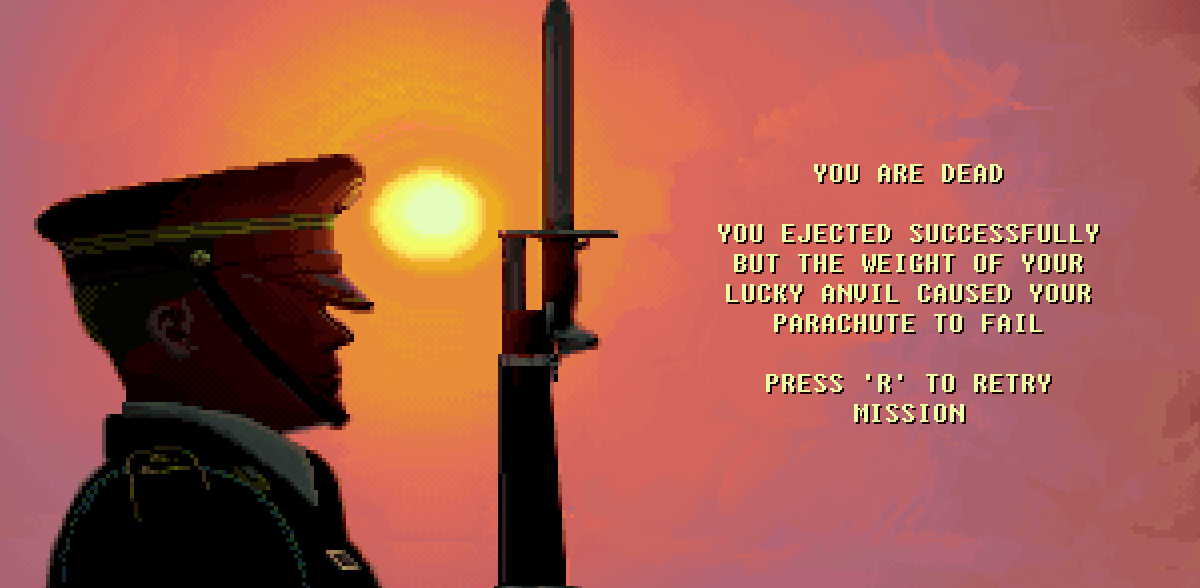
Tim: You realise some people think you’re dead?
Flight Simulation: [Laughs] Those people need to have a shufti at DCS: Black Shark, Rise of Flight or the latest update of Battle of Britain II. I’m fighting-fit dear boy. Never felt better.
Tim: That’s good to hear, but you can understand the misconception. There was a time when you worked with all the big publishers and developers, appeared on magazine covers, topped charts… Today – well – things are very different aren’t they. Do you ever wonder why that is?
Flight Simulation: Every bally day! For years I put it down to the ‘The Icarus Effect’. Back in the late Nineties I started doing a lot of speed, and airflow calculations, and reading a lot of heavyweight history. Realism became a bit of an obsession. As a result the sims got bigger… denser… chillier. Without realising it, I think I alienated a lot of fans.
Tim: But that period produced some great combat sims – Falcon 4.0, Rowan’s stuff, the Razorworks chopper games, the Janes titles…
Flight Simulation: It did. A core of serious simmers and influential reviewers seemed to love what I was doing, so naturally I kept doing it. However, what I failed to understand during that scramble for aeronautical authenticity, was that I was building an ivory control tower.
Tim: Metaphor?
Flight Simulation: Yes.

Tim: So you think it was your taste for complexity that eventually pushed you out of the limelight?
Flight Simulation: That’s what I used to think, yes. Now I actually believe it’s a little more complicated than that. Let me ask you something: when you started playing games like Fighter Pilot or Red Baron all those years ago, what was it that drew you to them?
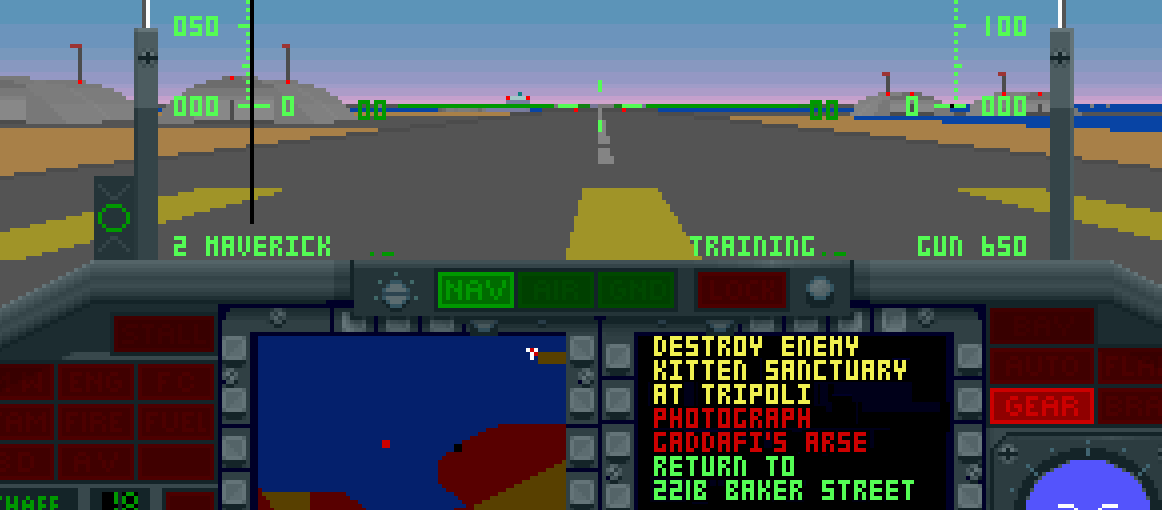
Tim: Umm. I guess the sensation of flight was attractive. The thrill and challenge of combat in three dimensions. Back then most shooty games were top-down, side-on or isometric.
Flight Simulation: Precisely. Perhaps my early popularity and subsequent side-lining have less to do with decisions I made than changes in the wider world of gaming. For years, if a person wanted the visceral frisson of first-person violence, he fired-up a flight-sim. That was the only option. With the growth of the FPS, cloud-couched combat with its tricky gunnery, dot-sized targets, and lethal floors, suddenly didn’t seem so appealing any more. Perhaps my slow swan-dive into relative obscurity was written in the stars.
Tim: But running down a corridor with a Sten Gun or a BFG isn’t quite the same thing as dancing round the firmament in a Spit or F-16.
Flight Simulation: True, but increasingly those two thugs, the FPS and third-person action game, are spreading their wings and stealing my thunder. When I started out in the business, I was the go-to guy for jets, helicopters, biplanes, turret fun etc. Now you can get airborne in any number of tin-pot soldier sandboxes. The realism isn’t there of course, but as I’ve explained, I don’t believe that was ever at the root of my popularity.
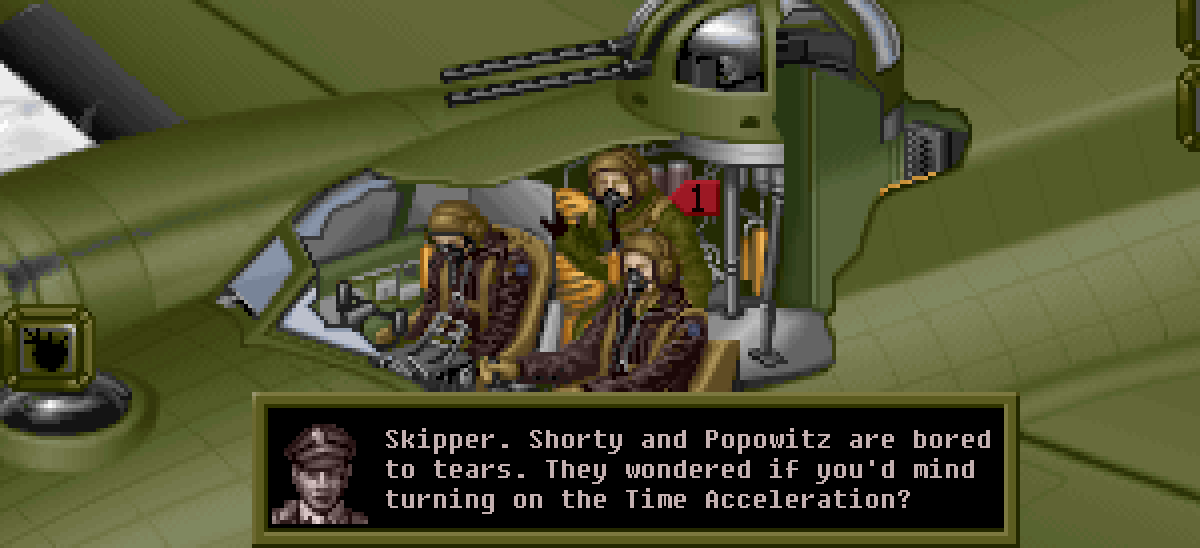
Tim: This is all sounding rather bleak. Do you think there’s a way back? Will we ever see a flight sim generating BioShock or Half-Life levels of interest?
Flight Simulation: [Smiles mysteriously] Let me tell you a story. A few years ago I was flying back from a sim convention in Mali when the Fairchild C-119 I was travelling in crash-landed in the Sahara Desert. The plane was a total write-off; no-one knew where we were; things looked desperate, but we refused to give in. Under my guidance the eight survivors slaved day and night for two long, hot weeks constructing a new plane out of the intact sections of the wreck. Incredibly that jerry-built aircraft flew and, clinging to its wings, we eventually reached the safety of an oil-drilling camp.
Tim: Umm. That sounds very similar to what happened in Robert Aldrich’s 1965 triumph-against-the-odds movie The Flight of the Phoenix.
Flight Simulation: Ah. Now I come to think about it, it was actually a movie. But the point still stands. Sometimes, cutting your plane up and radically re-arranging the bits is the sensible thing to do.
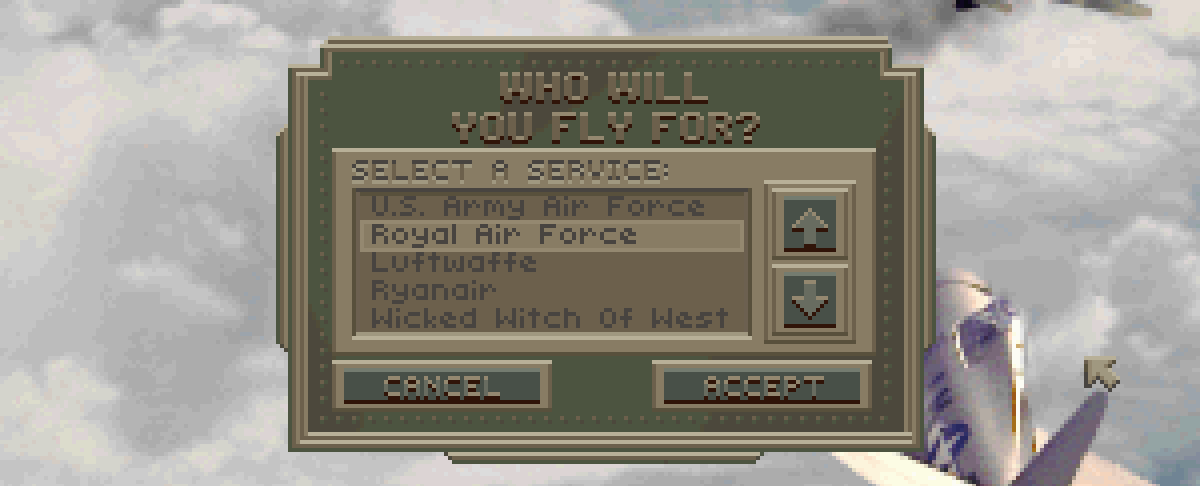
Tim: Fruit pastille?
Flight Simulation: Thanks.
[Glances around nervously] Just between you and me, the chaps I’ve been working with for the last decade – Oleg Maddox, Matt Wagner, Tsuyoshi Kawahito… are all splendid fellows , talented and totally devoted to me, but none of them have the balls, the vision, or the inclination to build The Phoenix.
The person who will drag aerial entertainment out of the comfortable, convincing ghetto in which it currently dwells won’t do it by modelling every switch in an A-10C or letting us fly obscure Regia Aeronautica warbirds (as noble as those goals are). He or she will… [Looks skyward in search of inspiration]… go back to roguish classics like Secret Weapons of the Luftwaffe, Crimson Skies, and Air Power for inspiration, They’ll borrow from other genres in the way that other genres have borrowed from me. They’ll give flight sim multiplayer the rocket up the arse it so desperately needs.
How is it possible that in July 2010, the genre that went massively multiplayer before almost any other still doesn’t have a decent populist MMO to its name? How is that possible? For heaven’s sake, it looks like we’re going to get a people’s tank sim before we get a people’s flight sim.
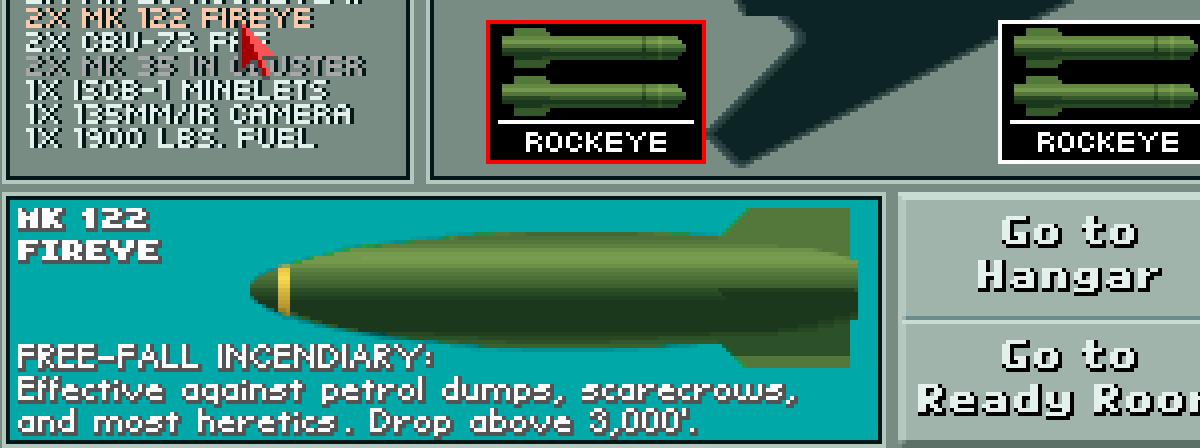
Tim: So you’d like to see sim devs taking a few more risks – thinking bigger?
Flight Simulation: I’d give my right aileron to see that. There’s no good reason why a flight sim shouldn’t be as tactically engaging as Combat Mission, as amusing as Time Gentleman, Please, as quirky as King’s Bounty, or as thought-provoking as The Void. On which of the Sacred Tablets of Games Design is it written ‘Aerial entertainment may not combine realistic dogfighting with doomed love, moving reflections on mortality, and porcine pilots.’?
In the games that flit like busy Pipistrelles through the courtyards of my dreams, I can stroll around aerodromes, I can design aircraft, I can pore over recon photos that are still tacky to the touch. I’m flying and fighting but I’m also worrying about where the next contract will come from, where to get replacement tyres for my Warhawks, or how to explain yet another pranged kite to my firebrand of a squadron leader.
Hell, just this morning watching the countryside roll by from the train, I saw a kestrel hovering above a pasture, and thought ‘Why are the only falcons I see in sims, of the General Dynamics variety?’.
Tim: So why aren’t devs – even indies – sticking their necks out?
Flight Simulation: I’m not sure. Maybe it’s indifference. Maybe it’s fear of your profession. Do you remember a game called Eurofighter Typhoon? It came out in 2001. That was one of the last sims I can remember that tried anything even remotely risky. Rage attempted to create a living, breathing airbase. Between dynamically-generated sorties you killed time in the mess, dozed on your bunk, stroked the squadron mascot… It dared to be different but you guys shot it down in flames.
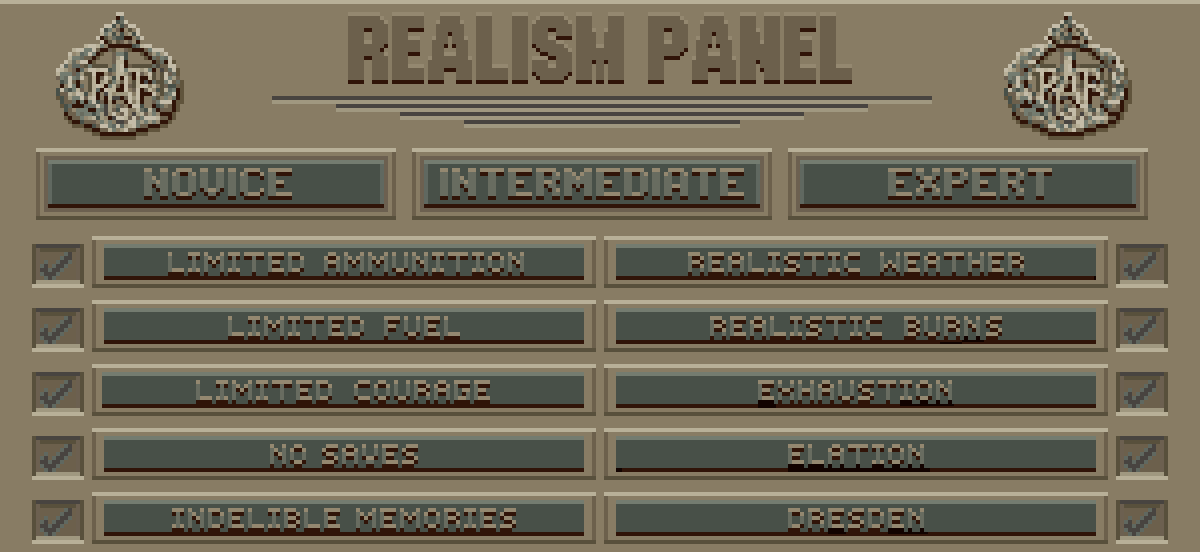
Tim: As I recall, there were some pretty serious flaws in Eurofighter Typhoon. The lulls between sorties sometimes lasted twenty mind-numbing minutes. I do take your point about the role of the reviewers though. Writing about a sim it’s all-too easy to fixate on the realism and campaign structure, and not address bigger, broader issues, like ‘Why is this sim basically just a more detailed version of the seven hundred that have gone before it?’. Most sites and mags assign the flight reviews to so-called specialists, which just exacerbates the problem. Maybe if we’d been less tolerant of realism-as-a-religion back in the Nineties – not placed the fruits of that approach the top of our Must Buy lists – then the genre would be in a healthier state today.
Flight Simulation: [Gazes wistfully at an empty packet of Wotsits wafted aloft by the slipstream of a low-flying Harrier] Do you know what I’ve always wanted to do? Get a huge group of bright, eloquent PC gamers together in one room (real or virtual) and ask them why they aren’t interested in winged warfare any more. I can theorize about my decline in popularity until the cows come home, but at the end of the day it’s all speculation. If flight simulation is to rise again we need to hear from the émigrés – the people that have drifted away over the years.
Tim: You know what, I might be able to help you there.

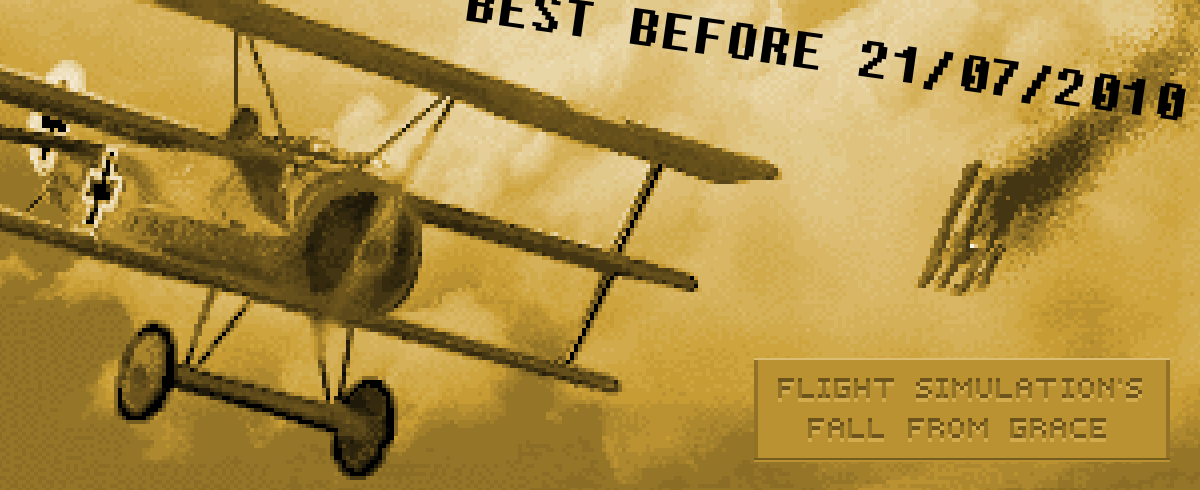
I feel like not much has changed in flight sims since this article was originally written. We do have War Thunder now and MSFS can be mainstream to an extent, and there are several cool little indie flying games out there now.
My biggest issue is that I tend to crave the ultra realism and shun the cuter stuff, yet I have no time to learn the realistic stuff and so I don’t end up playing much of anything.